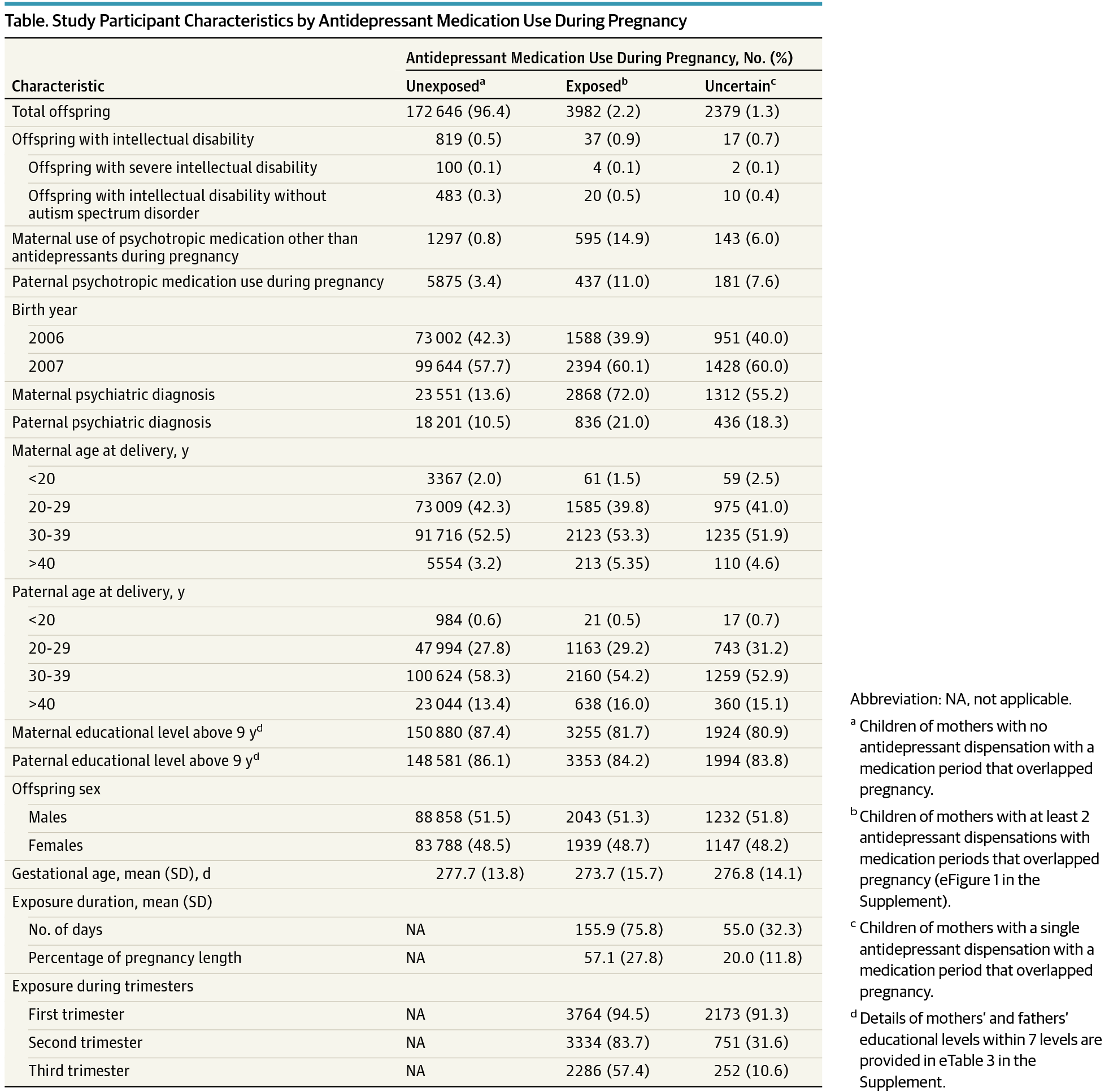JAMA Psychiatry ( IF 22.5 ) Pub Date : 2017-10-01 , DOI: 10.1001/jamapsychiatry.2017.1727 Alexander Viktorin 1 , Rudolf Uher 2 , Alexander Kolevzon 3 , Abraham Reichenberg 3 , Stephen Z. Levine 4 , Sven Sandin 1

|
Importance Maternal antidepressant medication use during pregnancy has previously been associated with adverse outcomes in offspring, but to our knowledge, the association with intellectual disability (ID) has not been investigated.
Objectives To examine the association of maternal antidepressant medication use during pregnancy with ID in offspring and investigate the importance of parental mental illness for such an association.
Design, Setting, and Participants A population-based cohort study of 179 007 children born from January 1, 2006, through December 31, 2007, with complete parental information from national registers who were followed up from birth throughout 2014.
Main Outcomes and Measures We estimated relative risks (RRs) and 95% CIs of ID in children exposed during pregnancy to any antidepressant medication or specifically to selective serotonin reuptake inhibitor (SSRI) antidepressants, all other non-SSRI antidepressants, or other nonantidepressant psychotropic medications. Analyses were adjusted for potential confounders. In addition to full population analyses, we used a subsample to compare mothers who used antidepressants during pregnancy with mothers who had at least one diagnosis of depression or anxiety before childbirth but did not use antidepressants during pregnancy.
Results Of the 179 007 children included in the study (mean [SD] age at end of follow-up, 7.9 [0.6] years; 92 133 [51.5%] male and 86 874 [48.5%] female), ID was diagnosed in 37 children (0.9%) exposed to antidepressants and in 819 children (0.5%) unexposed to antidepressants. With adjustment for potential confounders, the RR of ID after antidepressant exposure was estimated at 1.33 (95% CI, 0.90-1.98) in the full population sample and 1.64 (95% CI, 0.95-2.83) in the subsample of women with depression. Results from analyses of SSRI antidepressants, non-SSRI antidepressants, and nonantidepressant psychotropic medications and analyses in the clinically relevant subsample did not deviate from the full-sample results.
Conclusions and Relevance The unadjusted RR of ID was increased in offspring born to mothers treated with antidepressants during pregnancy. After adjustment for confounding factors, however, the current study did not find evidence of an association between ID and maternal antidepressant medication use during pregnancy. Instead, the association may be attributable to a mechanism integral to other factors, such as parental age and mother’s psychiatric disorder.
中文翻译:

妊娠期抗抑郁药物与后代智力障碍的关联
重要性 以前,孕妇在妊娠期间使用抗抑郁药与后代的不良结局有关,但据我们所知,尚未对与智力障碍(ID)的关系进行调查。
目的 探讨孕期孕妇使用抗抑郁药与后代ID的关联,并探讨父母精神疾病对这种关联的重要性。
设计,背景和参与者 对2006年1月1日至2007年12月31日期间出生的179 007名儿童进行了基于人群的队列研究,并获得了来自国家名册的完整父母信息,并从2014年开始对其进行随访。
主要结果和措施 我们估计了在妊娠期间暴露于任何抗抑郁药或选择性5-羟色胺再摄取抑制剂(SSRI)抗抑郁药,所有其他非SSRI抗抑郁药或其他非抗精神病药物的儿童的相对风险(RRs)和95%CI的ID 。针对潜在的混杂因素对分析进行了调整。除了全部人口分析外,我们还使用子样本将怀孕期间使用抗抑郁药的母亲与分娩前至少诊断为抑郁或焦虑但在怀孕期间未使用抗抑郁药的母亲进行比较。
结果 纳入研究的179 007名儿童(随访结束时的平均[SD]年龄为7.9 [0.6]岁;男性为92 133 [51.5%],女性为86 874 [48.5%]),确诊为ID 37名儿童(0.9%)暴露于抗抑郁药和819名儿童(0.5%)未暴露于抗抑郁药。通过对潜在混杂因素的调整,抗抑郁剂暴露后ID的RR在全部人群样本中估计为1.33(95%CI,0.90-1.98),在抑郁症女性子样本中估计为1.64(95%CI,0.95-2.83)。SSRI抗抑郁药,非SSRI抗抑郁药和非抗抑郁精神药物的分析结果以及临床相关子样本中的分析结果与完整样本结果并无差异。
结论和相关性 妊娠期接受抗抑郁药治疗的母亲的后代中,ID的未经调整的RR升高。但是,在对混杂因素进行调整之后,当前的研究没有发现ID和怀孕期间孕妇使用抗抑郁药之间存在关联的证据。相反,这种关联可能归因于其他因素所不可或缺的机制,例如父母的年龄和母亲的精神病。











































 京公网安备 11010802027423号
京公网安备 11010802027423号